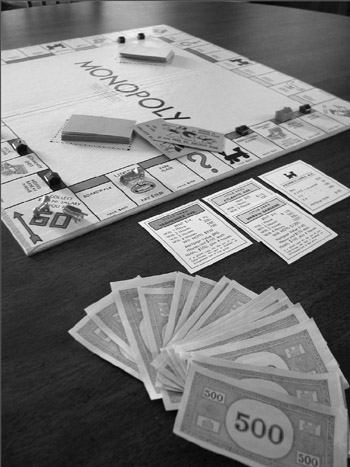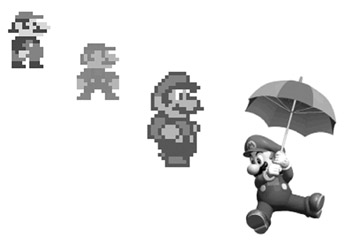Engaging The Player
|
| < Day Day Up > |
|
If the formal elements mentioned provide structure to the experience of games, then what gives these elements meaning for the players? What makes one game capture the imagination of players and another fall flat? Certainly, some players are engaged by pure abstract challenges, but for most players, there needs to be something else that draws them in and allows them to connect emotionally with the experience. Games are, after all, a form of entertainment, and good entertainment engages us and moves us both intellectually and emotionally.

Figure 2.10: Chess tournament and Quake tournament
This sense of engagement comes from different things for different players, and not all games require elaborate means to create it. Next we've listed some elements which allow a player to make an emotional connection with a game.
Play
In addition to providing structured environments for challenge and achievement, games can also provide opportunities for players to use imagination, fantasy, inspiration, social skills, or other more playful types of interaction to achieve objectives within the game space. The play might be serious, like the pomp and circumstance surrounding a Grand Master match in chess, or it might be charged and aggressive, like the marathon play environment of a Quake tournament. It might also be an outlet for fantasy, like the rich online worlds of EverQuest and Dark Age of Camelot. Designing for the type of play that will appeal to your players is another key consideration for keeping players engaged with the game.
Challenge
We said that experiences created conflict that the players had to work to resolve in their own favor. This conflict challenges the players, creating tension as they work to resolve problems and varying levels of achievement or frustration. Increasing the challenge as the game goes on can cause a rising sense of tension, or if the challenge is too great, can cause frustration. Alternately, if the challenge level remains flat or goes down, players may feel that they've mastered the game and move on. Balancing these emotional responses to the amount of challenge in a game is a key consideration for the keeping the player engaged with the game.
Exercise 2.6: Challenge
Name three games that you find particularly challenging and describe why.
Title
CEO, Apogee Software (a.k.a. 3D Realms)
Project list (five to eight top projects)
-
Duke Nukem
-
Max Payne
-
Wolfenstein 3-D
-
Raptor
-
Rise of the Triad
-
Shadow Warrior
-
over 30 more
How did you get into the game industry?
First as a journalist in 1982, then in 1987 starting my own company, Apogee Software. Apogee is known as the pioneer of shareware gaming-we invented the method of releasing one episode as shareware and selling additional episodes of the game directly ourselves. This allowed us to self-publish our first 20 games without the need of a retail publisher or outside funding. We made millions using this method before finally signing with traditional publishers in the mid-1990s. Id Software and Epic Games mimicked our shareware method and also rose to great success. It's no coincidence that all three companies are among the strongest, most successful, entirely independent development studios in North America. By first self-publishing our games we were able to build strong financial independence. This method allowed all three companies to make original intellectual property (IP) without the publisher getting long-term ownership and control of these IP. In fact, a developer's only chance of long-term success is to create and own an original IP. Without doing this, a studio is constantly under-the-thumb of finicky and often untrustworthy publishers. An IP gives a studio the clout needed to get the best publishing deals. Plus, as 3D Realms and Remedy have shown with the sell of the Max Payne IP, for over $45 million, an IP is where the real value of a studio resides. Additionally, 3D Realms has been offered $80 million for our Duke Nukem IP by a major publisher. Never doubt that making original IP that your studio owns is the best path to long-term success.
What are your five favorite games and why?
As a long time gamer, my list includes some classic oldies....
-
M.U.L.E: A breakthrough, addictive multiplayer game that is begging for a modern remake.
-
Diablo: The core gameplay is a model of simplicity, the execution borders on perfection, and the game continuously rewards the player through a brilliant system of ever-improving gear.
-
Tetris: Perhaps the most perfect computer game ever. Simple to learn, near-impossible to master, and equally appealing to either gender.
-
DOOM: A technical tour de force, and the first game to truly frighten players.
-
Space Invaders: The game that officially kicked off the arcade's golden years. The most adrenaline squirting game I've ever played.
-
Super Mario Bros.: I can't leave this game off my list because it was the first game that introduced the idea of a world for the player to explore, an idea that still continues to be seen in many modern games, including the GTA series.
What games have inspired you the most as a designer and why?
My self-education mostly comes from the arcade's golden years of the late 1970s and early 1980s, as this was the time that I instinctively learned rules like being fair to the player, simple interface, and dozens more. These early games could not rely on pretty graphics, they had to rely on solid gameplay mechanics, and so even nowadays I think in terms of gameplay first and foremost.
What are you most proud of in your career?
Working on a variety of very successful games, and co-creating two of the most recognizable game heroes in the game industry, Duke Nukem and Max Payne.
What words of advice would you give to an aspiring designer today?
Learn from other games and designers, but do not copy them. You absolutely must invent something unique and compelling (one without the other is not enough) to be a success. For example, at the time we were working on the concept for Max Payne, Tomb Raider was just out and a huge hit. We could have easily fallen into the trap of making a male version of Lara Croft, but that would have been recreating another Indiana Jones. So, instead, we looked at what Tomb Raider did well, and purposely picked other things for Max Payne to do well. It was critical for Max to be seen as a unique character, not a copycat. If you follow in other people's footsteps, you'll never be a leader.
Premise
Another way that games can create engagement is with an overarching premise, which gives context to the formal elements. For example, the premise in Monopoly is that the players are each landlords, buying, selling and developing valuable pieces of real estate in an effort to become the richest player in the game. This premise was quite appealing to down-and-out players during the Great Depression when the game was invented. It remains a favorite to this day, and one reason for that continued appeal is its premise-players enjoy the fantasy of being powerful, land-grabbing landlords with plenty of money to wheel and deal.
Many digital games have even richer premises. Our earlier example of Quake, for instance, places the game play in an immersive environment, filled with violent, militaristic imagery. The base-level effect of the premise is to make it easier for players to contextualize their choices, but it's also a powerful tool for involving players emotionally in the interaction of the formal elements.
Exercise 2.7: Premise
What are the premises for the games Risk, Clue, Pit, and Um Jammer Lammy? If you don't know these games, pick games that you are more familiar with.
Character
Recently, within the last 25 years, games have begun to address another potential tool for engagement, and that is the notion of character. In traditional storytelling, characters are the agents through which dramatic stories are told, and they can function this way in games as well, providing a way for us to empathize with the situation and live vicariously through their efforts. But characters in games can also be vessels for our own participation, entry points for us to experience situations and conflicts through the guise of a mask we create and direct. Character is a rich area for dramatic engagement in games, and many games, especially digital games, have explored this area of potential.
Story

Figure 2.11: Monopoly
Lastly, some games engage players emotionally by using the power of story within or surrounding their formal elements. Story differs from premise in its narrative qualities. A premise need not go anywhere from where it begins, while stories unfold with the game. How story can be integrated into gameplay is an ongoing and fairly contentious debate. How much story is too much? How little is too little? Should gameplay change the story? Should story dictate the gameplay? There is no one answer to this question, but it's clear from the interest of both players and designers that story integrated with play can create powerful emotional results.
Exercise 2.8: Story
Have any stories within a game ever gripped you, moved you emotionally, or sparked your imagination? If so, why? If not, why not?
Dramatic Elements
The games you picked in Exercise 2.1 on page 22 almost certainly have one or more of the elements described previously as a part of their design. We call these the 'dramatic elements' of games because they engage the players by creating a dramatic context for the formal elements. In Chapter 4 on page 96 we'll look at each of these more closely and discuss how you can use the dramatic elements to create rich experiences for your players.

Figure 2.12: The Evolution of Mario
|
| < Day Day Up > |
|
EAN: 2147483647
Pages: 162